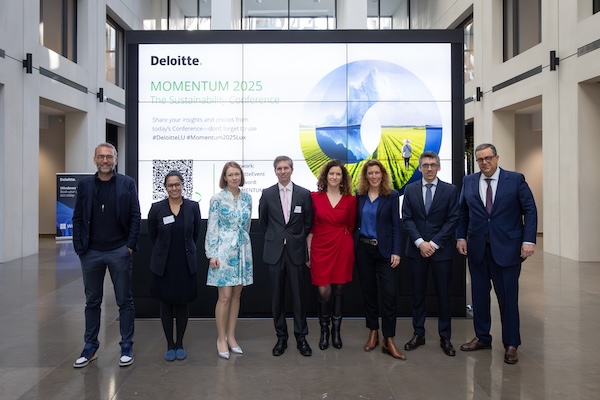 (L-R) Alexandre Mars (blisce/, Epic Foundation, INFIИITE); Imeshi Weerasinghe (WEO); Bettina Werner (Deloitte); Jérôme Petry (MECO); Chloé Piquet (Deloitte); Oriane Schoonbroodt (Deloitte); Sergio Venti (Deloitte); John Psaila (Deloitte);
Credit: Deloitte Luxembourg
(L-R) Alexandre Mars (blisce/, Epic Foundation, INFIИITE); Imeshi Weerasinghe (WEO); Bettina Werner (Deloitte); Jérôme Petry (MECO); Chloé Piquet (Deloitte); Oriane Schoonbroodt (Deloitte); Sergio Venti (Deloitte); John Psaila (Deloitte);
Credit: Deloitte Luxembourg
On Thursday 3 April 2025, Deloitte Luxembourg hosted the annual MOMENTUM Conference at its premises in Luxembourg-Gasperich.
This year’s agenda brought together industry leaders to explore strategies for navigating significant shifts in environmental, social and governance (ESG) undertakings and sustainable finance. The event also focused on strengthening the market’s resilience amid evolving sustainability trends and addressing the challenges posed by an ever-changing landscape.
Partner at Deloitte Luxembourg, Oriane Schoonbroodt, commented: "The landscape of sustainability has altered significantly. Previously considered a stable investment, it now needs to be revisited in the context of changing scenarios influenced by geopolitical tensions, regulatory adjustments and economic uncertainties."
The event began with opening remarks by CEO and Managing Partner at Deloitte Luxembourg, John Psaila, who stated: "We must go beyond regulation. The planet isn’t asking for footnotes. It’s asking for a new footpath. The future is not interested in how we define sustainability. It’s watching how we live it." His speech was followed by a fireside chat featuring entrepreneur and philanthropist, Alexandre Mars, founder of technology investment firm blisce/, the Epic Foundation and non-profit INFIИITE, in conversation with Oriane Schoonbroodt, during which they discussed forward-looking investment strategies.
At the event, the hosts noted that "among the geopolitical changes significantly influencing the current outlook are recent policy developments stemming from the US elections, whilst at the same time, the EU's shift away from its previous approach to ESG is contributing to uncertainty". Partner at Deloitte Luxembourg, Bettina Werner, added: "Luxembourg’s and Europe’s growth and competitiveness are closely linked with our ability to convert sustainability into actions."
During the conference, it was reported that many funds had stopped explicitly labelling their investments as ESG to avoid regulatory burdens and compliance costs. However, Partner at Deloitte Luxembourg, Sergio Venti, explained that this does not represent a withdrawal from ESG-aligned investments. He said: "While ESG investing has been part of asset management for years, 2021 marked a turning point, pushing ESG strategies to a new level of scale and integration. This acceleration was largely driven by an ambitious regulatory agenda at the EU level, aiming to embed sustainability into financial markets." He added: "However, as market conditions evolved, the initial wave of enthusiasm prompted many asset managers to reassess their ESG approaches. Regulatory frameworks have also matured, refining disclosure requirements to enhance investor protection. Today, the market sentiment is finding a balance [and] moving past early excitement towards more pragmatic and adaptable ESG strategies that acknowledge the diverse preferences of investors."
Deloitte reported that the gathered experts remain "cautiously optimistic" and emphasised the need to redefine sustainability as a "fundamental, value-creating strategy rather than merely a compliance trend". Speakers and professionals also discussed how sustainability could effectively align with profitability and competitive advantages.
Deloitte also highlighted the positive trend of the European Union’s (EU) increasing role as an institutional investor, demanding stronger ESG alignment from private equity firms as a condition for co-investment. They described how this drives sustainable transitions, reinforcing sustainability’s potential to enhance economic performance. Bettina Werner commented: "The entire ecosystem needs to come together like pieces of a puzzle to create a new momentum around sustainability, focusing on action and impact over compliance."
The conference also showcased a number of leading examples in relation to the benefits of ESG, including companies investing in renewable energy, clean technologies and circular economy initiatives, such as Aperam’s renewable forestry initiatives in Brazil, which reduce production costs while enhancing environmental sustainability. Sergio Venti enthused: "Such examples underscore that sustainability, when effectively implemented, delivers concrete financial and operational benefits."
A number of panel events were also held throughout the conference. The first asked "Impact or Illusion: Has asset management delivered on sustainable investing?" and examined whether the asset management industry has genuinely advanced sustainable finance or merely created a perception of progress. The moderator was Director at Deloitte Luxembourg, Chloé Piquet, and the discussion featured insights from Sergio Venti, François Ralet (Wellington Luxembourg) and Shaneera Rasqué (CSSF), who shared their perspectives on measurable impacts versus perceived achievements.
The second panel was entitled "Thrive or Fade: Redefining sustainability's role in driving Europe's growth" and explored how sustainability initiatives can be repositioned as catalysts for economic growth in Europe. Bettina Werner moderated this discussion, which gathered industry perspectives from Jérôme Petry (Luxembourg’s Ministry of the Economy), Carlos Eduardo Martins (European Stability Mechanism - ESM), Sudhakar Sivaji (Aperam) and Imeshi Weerasinghe (World Economic Outlook - WEO), who discussed the challenges and opportunities in sustaining growth through environmental strategies.
Concluding the event, Director of Artificial Intelligence and Growth at Workshop4Me, Avanti Sharma, reflected on key moments from the discussions, emphasising the intersection of sustainability and innovation.
In closing, Deloitte remarked that "MOMENTUM 2025 reaffirmed its role as a key platform for the financial community, fostering open dialogues on sustainable investing” and that “from the opening remarks to closing insights, the event blended practical strategies with bold visions for finance."
SM








